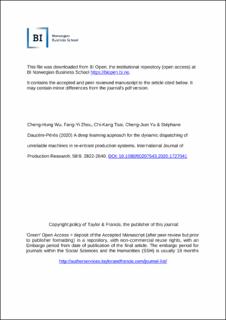A deep learning approach for the dynamic dispatching of unreliable machines in re-entrant production systems
Journal article, Peer reviewed
Accepted version
Date
2020Metadata
Show full item recordCollections
- Scientific articles [2217]
Original version
International Journal of Production Research. 2020, 58 (9), 2822-2840. 10.1080/00207543.2020.1727041Abstract
This research combines deep neural network (DNN) and Markov decision processes (MDP) for the dynamic dispatching of re-entrant production systems. In re-entrant production systems, jobs enter the same workstation multiple times and dynamic dispatching oftentimes aims to dynamically assign different priorities to various job groups to minimise weighted cycle time or maximise throughput. MDP is an effective tool for dynamic production control, but it suffers from two major challenges in dynamic control problems. First, the curse of dimensionality limits the computational performance of solving large MDP problems. Second, a different model should be built and solved after system configuration is changed. DNN is used to overcome both challenges by learning directly from optimal dispatching policies generated by MDP. Results suggest that a properly trained DNN model can instantly generate near-optimal dynamic control policies for large problems. The quality of the DNN solution is compared with the optimal dynamic control policies through the standard K-fold cross-validation test and discrete event simulation. On average, the performance of the DNN policy is within 2% of optimal in both tests. The proposed artificial intelligence algorithm illustrates the potential of machine learning methods in manufacturing applications.
